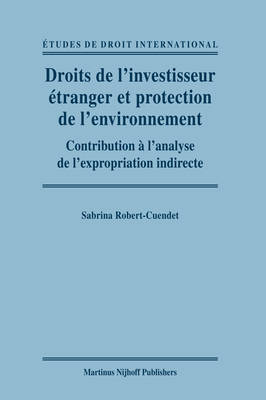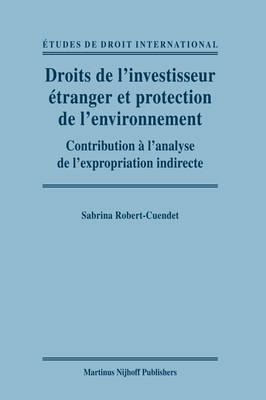
- Afhalen na 1 uur in een winkel met voorraad
- Gratis thuislevering in België vanaf € 30
- Ruim aanbod met 7 miljoen producten
- Afhalen na 1 uur in een winkel met voorraad
- Gratis thuislevering in België vanaf € 30
- Ruim aanbod met 7 miljoen producten
Zoeken
Droits de l'Investisseur Étranger Et Protection de l'Environnement
Contribution À l'Analyse de l'Expropriation Indirecte
Sabrina Robert-Cuendet
€ 354,45
+ 708 punten
Omschrijving
En droit international de l'investissement, le prisme de l'expropriation indirecte couvre une large catégorie de mesures - telles que les réglementations - qui n'impliquent pas de transfert de propriété mais aboutissent à une grave interférence avec un investissement. La définition des dépossessions indemnisables constitue une question extrêmement sensible, située à la croisée des chemins entre la protection des droits des investisseurs et la préservation des prérogatives de l'Etat. Cet ouvrage explore, à travers l'exemple de la réglementation environnementale, le droit applicable à cette notion controversée. Il montre que l'approche traditionnelle - reposant sur une dilution du concept d'expropriation - n'est nullement appropriée et il contribue à clarifier l'étendue de la protection de l'investisseur sur le fondement du droit de la responsabilité internationale de l'Etat.
In international investment law, the prism of indirect expropriation includes a broad range of measures - such as regulatory measures - which do not involve a transfer of property but result in a serious interference with an investment. The definition of compensable taking is a very sensitive issue situated at the crossroads between the protection of investors' private rights and the safeguarding of the state's sovereign prerogatives. This book explores, through the example of environmental regulation, the law applicable to this controversial topic. It suggests that the traditional approach - based on an extension of the concept of expropriation - is inappropriate and it contributes to clarifying the scope of the international protection of the investor on the ground of the law of state responsibility.
In international investment law, the prism of indirect expropriation includes a broad range of measures - such as regulatory measures - which do not involve a transfer of property but result in a serious interference with an investment. The definition of compensable taking is a very sensitive issue situated at the crossroads between the protection of investors' private rights and the safeguarding of the state's sovereign prerogatives. This book explores, through the example of environmental regulation, the law applicable to this controversial topic. It suggests that the traditional approach - based on an extension of the concept of expropriation - is inappropriate and it contributes to clarifying the scope of the international protection of the investor on the ground of the law of state responsibility.
Specificaties
Betrokkenen
- Auteur(s):
- Uitgeverij:
Inhoud
- Aantal bladzijden:
- 548
- Taal:
- Frans
- Reeks:
- Reeksnummer:
- nr. 4
Eigenschappen
- Productcode (EAN):
- 9789004183292
- Verschijningsdatum:
- 12/05/2010
- Uitvoering:
- Hardcover
- Formaat:
- Genaaid
- Afmetingen:
- 157 mm x 236 mm
- Gewicht:
- 884 g

Alleen bij Standaard Boekhandel
+ 708 punten op je klantenkaart van Standaard Boekhandel
Beoordelingen
We publiceren alleen reviews die voldoen aan de voorwaarden voor reviews. Bekijk onze voorwaarden voor reviews.








